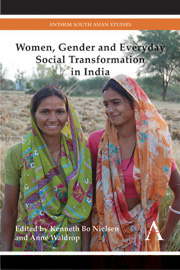Women and Gender in a Changing India
Published online by Cambridge University Press: 05 October 2014
Summary
The pace of socioeconomic transformation in India over the past two and a half decades has been formidable. In this volume we are concerned with examining how these transformations have played out at the level of everyday life to influence the lives of Indian women, and gender relations more broadly. The 15 chapters in Women, Gender and Everyday Social Transformation in India conceive of these ongoing everyday transformatory churnings as undercurrents that play out well below the radar screen of the national and international media, and beyond the realm of the spectacular. To analyse these everyday transformatory churnings our authors look closely and ethnographically at a diversity of everyday ‘sites of change’ (Rao et al. 1996) in which macrostructural processes of social transformation interface with everyday lifeworlds to generate new contestations and contradictions that impinge directly on the everyday lives of ordinary Indian women, and on the relations between genders. In doing so, they combine to identify the ambiguous, contradictory and contested coexistence of discrepant gendered norms, values and visions in a society caught up in wider processes of social transformation. They also provide us with some cause for cautious optimism. Thus, while much of the current debate on women and social change in India is, for very good reasons, dominated by the pessimism triggered by the apparent increase in brutal sexualized violence against women, and the very low child sex ratio that makes India ‘a terrible place for girls’ (Reddy 2012; see also Jha et al.
- Type
- Chapter
- Information
- Women, Gender and Everyday Social Transformation in IndiaA Revisionary History, pp. 1 - 18Publisher: Anthem PressPrint publication year: 2014



